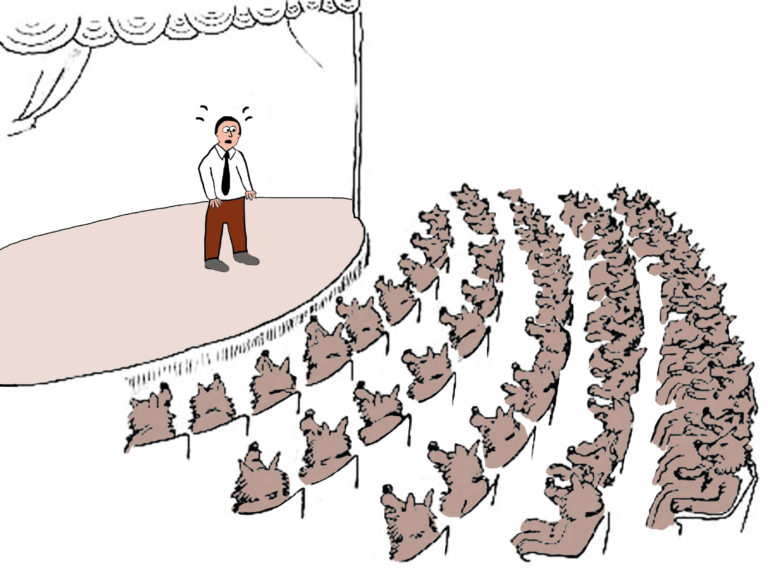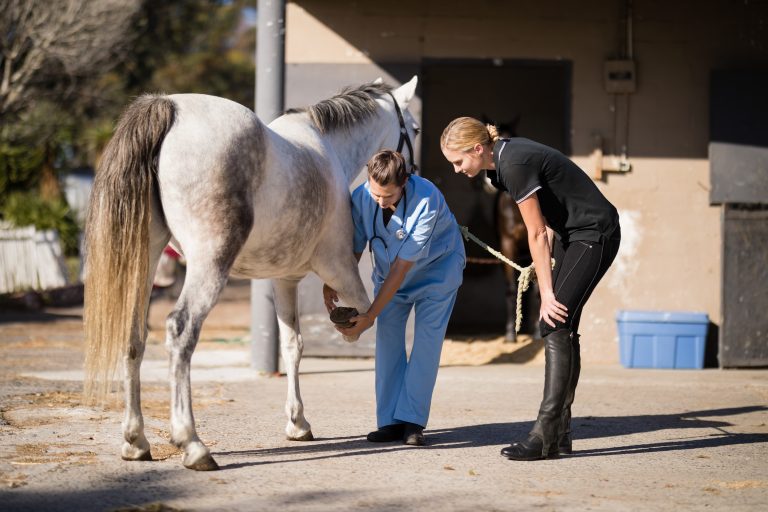
Whether the new team member is an associate or an intern, a good mentoring relationship is crucial to the young veterinarian’s professional development. By showing confidence in the mentee and generously sharing experiences, knowledge and skills, the mentor can have a marked influence on the future of his or her colleague. Because all people bring different perspectives, an environment where psychological safety is present is essential for the best mentoring of new grads.
Work by researcher Amy Edmundson, PhD, MS, has shown that psychological safety within the workplace is one of the most important factors leading to learning behaviors. In a presentation by Stacey Cordivano, DVM, at the 2022 AAEP Annual Convention, she explained the concept in the following way: “Psychological safety is a condition in which you feel included, safe to learn, safe to contribute and safe to challenge the status quo—all without fear of being embarrassed, marginalized or punished in some way.”
Sadly, Cordivano reported that 67% of equine veterinarian respondents to a survey question asking if they had been penalized or punished at work for a mistake or for offering an idea answered “Yes.”
In order for maximal learning to occur, candor must be accepted, mistakes must be forgiven, questions need to be seen as a strength rather than a weakness and questioning the status quo should occur without fear. In a practice where the culture is not entirely safe, a mentor can provide a zone of safety where the mentee can be heard and can learn more effectively.
Modern Mentoring
Many traditional mentoring relationships are hierarchical, one-way relationships where the mentor dispenses wisdom and the mentee passively receives direction. Although mentors, by definition, have more experience in the profession, mentees bring their own perspectives, life experiences and talents to the relationship. The best mentoring is reciprocal, where both parties gain benefit. In a high-quality reciprocal mentoring partnership, the mentor values and is influenced by their mentee. There is a bi-directional movement of knowledge. This helps the mentee gain confidence and self-value.
Mentors have been said to have seven functions. These include being: 1) a teacher, who passes on skills and knowledge; 2) a sponsor, who introduces the new entrant to others and acts as a booster; 3) an advisor,who answers questions when uncertainties arise; 4) an agent, who removes obstacles when necessary; 5) a role model, who walks their talk, and lives their values; 6) a coach, who encourages, motivates and pushes when necessary; and 7) a confidante, who listens, maintains confidentiality and is trustworthy as well as reliable. Filling all of these roles is a responsibility and an honor.
New Perspectives
New graduates often bring knowledge of the newest developments in diagnostics, treatment, and techniques. They are exposed to multiple veterinary practices through externships, internships or attending a veterinary school using a distributive model for the clinical years. If open to new ideas and approaching with curiosity, a mentor can learn many new ideas for solving common problems. Nothing stifles engagement like the answer to a new graduate’s suggestion or query being “This is the way we do it here” or “We’ve always done it this way.”
When there is a difference in gender between mentor and mentee, difficulties can emerge. Research at the Harvard Business School has shown that men who mentor women sometimes assume a hero role, with their job being to protect and rescue the mentee from harm in the organization or to become the all-knowing guru. This implies weakness in the subordinate.
Women can struggle to become independently successful in these situations. Over time, their revenue production and engagement can suffer.
Likewise, women who mentor men can be challenged with the communication style differences between genders. This can cause a struggle with women being effective in a mentor role. Awareness of these challenges and meeting them with transparency can mitigate many of the issues.
Steps to Start
When starting a mentoring relationship, each party should begin by telling his or her own story, including some personal details. This beginning can transform the path of a mentoring relationship because it demonstrates that the mentor is truly interested in understanding the mentee and his or her journey, not just in dispensing professional advice. By having knowledge of the mentee’s past, the mentor can make more germane inquiries over time.
When the mentor tells their story, describing one or two difficult career and personal chapters can set the stage for a deeper relationship of more impact and value. As the relationship develops, the mentor should be sure to teach the mentee how to work through a problem, not simply provide the answer they think is best.
The elements of reciprocal mentoring that lead to the most successful results include humility, shared power whenever possible, bi-directional reflective listening, and helping one another find success outside of career aspirations alone. Perhaps the intern loves to bake and the mentor struggles with creating a perfect sourdough loaf. The mentor might know the best rock-climbing spots near the practice to share with the new associate.
In addition, the mentor should ask about the mentee’s professional aspirations and direct their teaching to help meet those goals. Asking for the new associate or intern’s opinion about a case that the mentor is a bit perplexed about could occasionally yield information about a similar case seen during the intern’s time in vet school, and it will always prompt a useful thought process that will benefit the new clinician.
Mentoring Feedback
When giving feedback on the mentee’s performance, best practices include asking how the person prefers to receive it. At the end of the day, or at the beginning? At the end of the week or before a day off, or never before such a time? Immediately, regularly, or intermittently?
Obviously, some feedback requires immediacy. However, as much as possible, it should be given in private away from clients and team members.
Some people prefer to go for a walk rather than have a conversation in an office. If a response is expected, ask the mentee how much time they need to formulate one. This respect for individual preferences is appreciated and builds trust.
A reciprocal mentoring relationship requires self-awareness in the mentor and the ability to not feel threatened or diminished by the mentee’s successes. While this might seem unlikely when an intern is the mentee, a mentor that dreamed of doing a residency at a certain university might have unexpected feelings of jealousy or loss if the protégé gains entry where the mentor did not.
Allowing the Mentee to Achieve Success
As an associate develops their career, it is important for the mentor to “move over” and let the mentee achieve successes out from under the shadow of the mentor. This can sometimes be personally challenging to the mentor.
An associate with strong communication skills, clinical strengths or from a different generation might gain clients that used to prefer the older doctor. Sometimes this provokes a feeling of personal failure or irrelevancy rather than pride in the mentor. These uncomfortable emotions can be managed by embracing leadership where the highest good is in creating other leaders, not in gaining power or prestige.
Some of the most effective and important mentoring conversations might center on concerns such as professional identity, work-family integration, personal confidence and resilience in the face of stress. By being vulnerable and understanding as well as voicing one’s unique areas of weakness, a mentor can provide a strong model of human imperfection partnered with expertise and success. This example can help a mentee build resilience and prevent imposter syndrome.
Imposter Syndrome
Imposter syndrome is very common in the medical professions, and it can paralyze newer veterinarians as well as experienced practitioners. The feelings of not being adequately prepared, being uniquely unqualified compared to peers, and being fearful of this inadequacy being discovered can lead to low confidence, failure to take risks and the tendency to avoid situations where their performance will not immediately be perfect.
A mentor can have a great impact in preventing imposter syndrome by providing opportunities for learning that normalize the necessity for building skills through repetitive experiences. The mentor can also minimize risks of adverse events through thoughtful supervision and can help the mentee build confidence through a series of successful experiences of increasing difficulty.
Mentors as Gatekeepers
While mentoring is generally accepted as uplifting new entrants to the profession, enhancing their learning and introducing them to networks that will enhance success, mentors are also gatekeepers, especially in the medical professions, to prevent unqualified individuals from attaining positions in which they could harm patients.
This aspect of mentoring new grads can be uncomfortable, and fortunately, it is not frequently called into play. However, honest conversations in these circumstances are absolutely warranted if a mentee is self-directed toward a career path for which they are obviously unsuited.
Kindness, empathy and clarity are needed in these difficult moments. Avoiding this discomfort by judging, rejecting or distancing from the mentee is very harmful. While candor is not easy, it is necessary. The conversation might be made easier by suggesting more appropriate opportunities for the mentee’s strengths and offering assistance in pursuing those other directions.
Take-Home Message
Mentoring new grads is a commitment of time and energy, but the satisfaction of helping create a skilled practitioner and new leader in the profession is enduring. While it can sometimes be hard to see another veterinarian’s achievements as not diminishing one’s own, overcoming this fear is one of the transformations of becoming a high-level leader. Approach mentorship as a commitment to giving back to the profession through servant leadership. This can be the beginning of a fulfilling journey.








